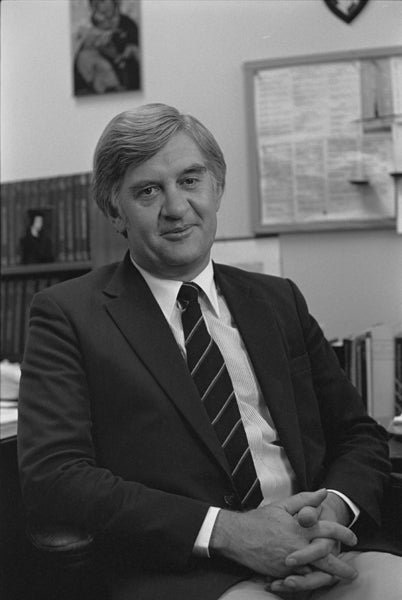|
July 18, 2013
Memorial service set for Robert Hamerton-Kelly, former dean of the chapel
Hamerton-Kelly spent more than two decades working at Stanford, including 13 years as dean of Stanford Memorial Church and 10 years as a senior research scholar in ethics. By Kathleen J. Sullivan

Robert Hamerton-Kelly served as the dean of Stanford Memorial Church from 1973 to 1986. (Photo: Chuck Painter / Stanford News Service archives)
A memorial service will be held at 7 p.m. on Aug. 1 at the First United Methodist Church in Palo Alto, Calif., for the Rev. Robert Gerald Hamerton-Kelly, who served as dean of the chapel of Stanford Memorial Church from 1973 to 1986.
Hamerton-Kelly died July 7, after a stroke and a short illness, in Portland, Ore., where he had moved with his wife, Rosemary, in 2010. He was 74. A service is being held in Portland today.
At Stanford, Hamerton-Kelly also served as a consulting professor of religious studies and a lecturer in classics. He taught a variety of courses to undergraduate and graduate students, including New Testament Greek and Western civilization.
His family said Hamerton-Kelly's years at Stanford were productive and invigorating both professionally and personally. His wide interests in ethics, politics and history put him in touch with some of the great minds of the day.
In particular, his interest in religion and violence, and the work of fellow Stanford Professor René Girard, led him to be an advocate for Girard's mimetic theory, which emphasizes the role of imitation in our lives. Girard's theory suggests that mimesis is the basis of all human conflict and that the resolution of conflict through the public sacrifice of a scapegoat was the foundation of archaic religions and civilizations. Hamerton-Kelly wrote six books and edited four more, most of which wove mimetic theory into the teachings of the New Testament.
After he left his post as dean of the chapel, Hamerton-Kelly continued as a lecturer in classics from 1987-1994.
Studied ethics of nuclear weapons
In 1987, Hamerton-Kelly became a senior research scholar in ethics at the Center for International Security and Arms Control (now known as the Center for International Security and Cooperation (CISAC), where he focused on the ethics of nuclear weapons and the Cold War. He held the post for 10 years.
From 1989-1997, he also taught classes on the ethics of international security and the ethics of military intervention to students in Stanford's International Relations Program.
Sidney D. Drell, the founding co-director of CISAC, emeritus professor of theoretical physics and emeritus deputy director of SLAC National Accelerator Laboratory, said the Drell and Hamerton-Kelly families have been friends since they met 40 years ago – initially drawn together through the friendship of their daughters.
Drell said Hamerton-Kelly provided a critically important dimension to the study of arms control at Stanford: the moral and ethical issues raised by the destructive power of nuclear weapons.
"We were close friends and intellectual colleagues," said Drell, now a senior fellow at the Hoover Institution. "He was not just a wonderful person, but a very creative person in many dimensions of his work."
In 1990, Hamerton-Kelly co-founded the Colloquium on Violence and Religion, an international scholarly group whose journal, Contagion: Journal of Violence, Memesis and Culture, is a leading publication in the field of mimetic theory.
In the early 1990s, Hamerton-Kelly spent time in Central Europe, participating in activities arising out of the collapse of the Soviet empire and the realignment of Central Europe.
In 1996, he became the senior pastor of Woodside Village Church, in Woodside, Calif.
Hamerton-Kelly retired from there in 2004. In 2007, he became president of Imitatio Inc., a foundation for supporting research concerning René Girard's theories.
Educated abroad
Hamerton-Kelly, who was born in Cape Town, South Africa, on Dec. 26, 1938, earned a bachelor's degree in 1958 from Rhodes University in South Africa. He earned a second bachelor's degree in theology in 1961 and a master's degree in theology in 1965 – both at Cambridge University in England. He married fellow Cambridge student Rosemary Ann Daly in 1962. The couple had three children.
Hamerton-Kelly earned a doctoral degree in theology in 1966 at the Union Theological Seminary in New York City. From the mid-'60s until his arrival at Stanford in 1973, he served on the faculties of Scripps College in Claremont, Calif., and the McCormick Theological Seminary in Chicago.
He is survived by Rosemary, his wife of 51 years; daughter Ruth Wallin and son-in-law John Wallin, both of whom graduated from Stanford in 1987; son Paul, who graduated from Stanford in 1989, and daughter-in-law Siouxsie Jennett, all of Lake Oswego, Ore.; son Christopher and daughter-in-law Stacey, of Desert Hot Springs, Calif.; and seven grandchildren.
In lieu of flowers, the family suggests donations to the First United Methodist Church in Portland, the Portland Opera, or the Sempervirens Fund.
-30-
|